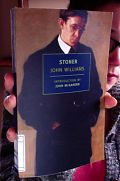
John Williams
Stoner
I think it was several years ago now that Stoner by John Williams was reviewed by John Self of Asylum, first sparking my interest. Since then I have remembered the title and author always hoping I would somewhere run into the book in the relatively sterile literary streets of Rome. Surprise! Last spring it popped onto the new acquisitions list of the library I use, and I checked it out, eventually.
Interim I read Augustus by John Williams, a portrait of the Emperor told through letters. The style of that book is similar to Stoner in its subtlety, but while Augustus went deep into an era and events surrounding one person, Stoner penetrates as deeply into spiritual (and this adjective is loose and baggy) life of one man: John Stoner.
Stoner, I think, is a writer’s and reader’s book. It appeals to those who have spent long hours engrossed in the life of the mind and the results of its toil. Plotwise Stoner shrinks next to Augustus, but as life goes Stoner brings up some of the biggest questions humans are faced with.
By most accounts Stoner’s life is a failure: his marriage, his relationship to his daughter, his friendships, and even at the University his career sentiently plods along, not rising and sometimes even falling. What did he ever have, this serious, quiet man? He teaches his classes everyday with a perseverance that to the outside must seem dumb. The questions rise: What is the value of life? What is important and what isn’t? How is it measured? We start out with no intentions, walking along the red dusty road and at the end we have a life behind us. Is that who we are? Or is it something else? The part of us that lives within, bristling at the world and with it?
He had come to that moment in his age when there occurred to him, with increasing intensity, a question of such overwhelming simplicity that he had no means to face it. He found himself wondering if his life were worth the living; if it had ever been. It was a question, he suspected, that came to all men at one time or another; he wondered if it came to them with such impersonal force as it came to him. The question brought with it a sadness, but it was a general sadness which (he thought) had little to do with himself or with his particular fate; he was not even sure that the question sprang from the most immediate and obvious causes, from what his own life had become. It came, he believed, from the accretion of his years, from the density of accident and circumstance, and from what he had come to understand of them. He took a grim and ironic pleasure from the possibility that what little learning he had managed to acquire had led him to this knowledge: that in the long run all things, even the learning that let him know this, were futile and empty, and at last diminished into a nothingness they did not alter.
There are moments of pure beauty in Stoner, for its prose and its truthfulness. Its subtlety betrays its complexity and strength. Its a novel I would one day love to write.
· · · · · · · · · · · · · · · · · · · ·